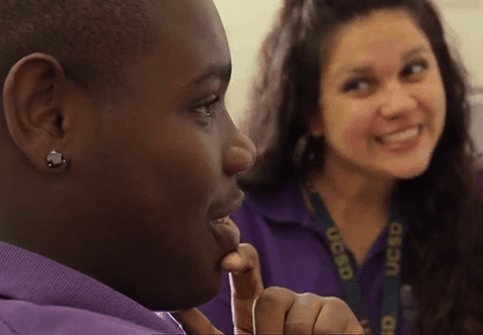Facilitating Systems Change

Lydia Dobyns
Change is hard work. No one knows this better than New Tech Network (NTN) school administrators. Leading a school through systemic change requires constant attention to all stakeholders and developing multiple adaptive strategies to build vibrant learning environments that challenge and reward students and teachers.
We are bombarded with heroic figures in education ─ films that showcase the brave, dedicated teacher or principal succeeding despite a broken system all around the school or classroom. While this might make for a great Hollywood treatment or a “60 Minutes” profile, it does not tell the whole and much more complex stories of transformation taking place across this country. The New Tech philosophy is to facilitate school transformation within the public education system, and we find that effective school directors possess a growth mindset and demonstrate highly adaptive leadership styles.
In recent years, we have learned the importance of building understanding around a growth rather than fixed orientation, for both the adults in the education system as well as the student learners. A fixed mindset says that our abilities are set ─ for example, either you are or are not good at algebra. The fixed mindset limits learning and growth because it prevents us from approaching challenges with a sense that any effort extended will lead to learning and persistence will lead to success.
Conversely, a growth mindset is the belief that our skills and knowledge are things we can cultivate through our own efforts. Jim May, NTN’s Senior Director of Schools and Leadership, offers this perspective: “The growth mindset makes you crave challenge and see failure as an opportunity for new learning and growth.”
Bernie Trilling, P21 Senior Fellow and Founder and CEO of 21st Century Learning Advisors, said, “Today’s educational leaders need all kinds of courage and support to tackle the challenges ahead like transforming the adult culture in a school to be a model of a growth mindset ─ a culture of strong beliefs in taking risks and learning from missteps, of hope and possibilities, not stress or fear or failure. If the adults in the school, district and community have mindsets like these, the students will certainly thrive and be more successful in learning, work and life.”
At NTN’s recent Spring Leadership Summit held in Napa, CA, almost 200 educators gathered for another instance of deep professional learning around system transformation. This twice-yearly Summit for directors and school ‘thought partners’ across the New Tech Network of 160 schools provides rich learning opportunities that can connect to the daily operations all leaders face.
“We asked the question: How do school leaders fit in their system?” said Paul Curtis, NTN Director of School Quality, about the recent Summit. “A major theme of the Summit was the idea that there is no such thing as a dysfunctional organization because every organization is perfectly aligned to achieve the results it currently gets. This illusion of the broken system predictably signals the demise of any change initiative because the assumption is that the system must be fixed first. By viewing the system as perfectly designed for its current outcomes, it both opens the door to the idea that we can redesign the system and that we must see the entire system to understand how to create the outcomes we want.”
School leaders looked at their roles in their system. Most of us see ourselves in the organization’s hierarchy as either at the top, at the bottom or in the middle. In reality, these roles are very fluid and at different times (even in the same day) we may be operating at different levels depending on the situation we are facing. Even more important than understanding our position in the hierarchy is understanding how we can strive to reach our potential in that role and how we can often sabotage ourselves as well.
School change takes time. Successful system change requires a complex set of simultaneous and aligned interventions and adjustments, rather than a series of quick-fix solutions. Our human nature assumes the system is broken; however, we are exploring a different lens. What if the system was not broken? What if we developed strategies that allow us to deepen our understanding of how systems work so that we feel empowered to construct positive system experiences ─ experiences that serve you, your team, peers and colleagues to achieve your goals? We, along with our school leaders, remain curious and eager to learn how we might construct this as our collective reality. Just imagine how this might lead to vibrant public schools as the new normal.
New Tech Network collaborates with public schools to create vibrant learning organizations where students graduate ready for college and career. We work with district teams, school leaders and teachers to create authentic learning that is grounded in inquiry, reflection, and individual agency.
To learn more about preparing leaders, see:
- Design Thinking Course Trains Future EdLeaders
- How Should Principals Be Trained? Like MBAs? Like CEOs?
- Leadership Mindsets for Breakthrough Leaders
This post is part of our “Preparing Leaders for Deeper Learning” series. If you have thoughts about what today’s school leaders should know and be able to do and how they should be prepared, we’d love to hear from you. Contact [email protected] with the subject “Preparing Leaders” for more information.

Lydia Dobyns is President and CEO of New Tech Network. Follow Lydia on Twitter at @LydiaDobyns.






0 Comments
Leave a Comment
Your email address will not be published. All fields are required.